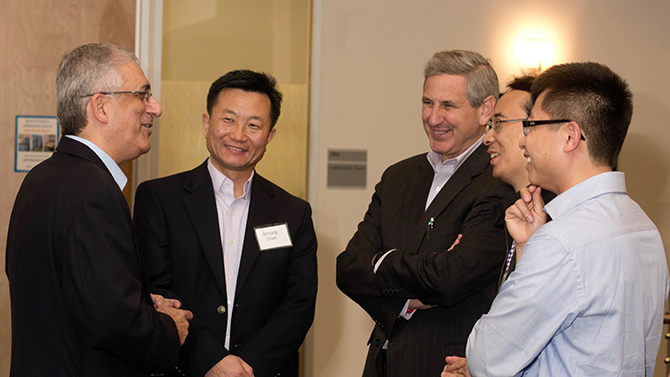


Investors' reactions
Photo by Duane Perry October 21, 2016
Rai discusses ‘market inefficiency,’ solutions in IFSA presentation
Given recent improvements in technology and data analytics, you might think that investors have mastered the technique of responding to news, whether good or bad, about the companies in which they invest.
But research suggests that investors underreact to news. How is this possible?
Georgia State University’s Arun Rai discussed this problem, called “market inefficiency,” and his research into its solutions at a recent lecture hosted by the Institute for Financial Services Analytics at the University of Delaware’s Alfred Lerner College of Business and Economics.
Truly efficient markets, Rai said, “will completely and instantaneously incorporate news into the valuation of the firm. But there’s been accumulating evidence over time that markets are not efficient, that there are boundaries to the efficiencies of these markets.”
“So how severe is this problem?” Rai asked. He explained that evidence suggests that market inefficiency exists in markets around the world, and that stock mispricing can cost firms millions in litigation. Mispriced stocks can also negatively impact decision-making based on stock prices, like evaluation of managerial performance, he added.
“There’s substantial value that’s at stake,” he said. “The allocation of capital is affected by stock mispricing, and it also has significant influence on corporate investment decisions.”
In terms of the root causes of market inefficiency, Rai identified two types of psychological biases that investors exhibit:
• The anchoring bias: “The estimate of anything that I’m going to come up with is anchored by my starting point, my view of the world, my meaning, my private information.”
• Overconfidence: “Overestimating the precision with which I can actually predict something.”
“When you combine these who, you overweigh prior information and underweight public information,” Rai said. “And this leads to underreaction to public news.”
Research also suggests that information uncertainty (IU), caused by volatility, poor-quality information and reporting errors, worsens the underreaction anomaly. Since investors already undervalue public information, they undervalue ambiguous public information even more.
In this, Rai explained, lies an opportunity: If firms can reduce information uncertainty by improving information technology with programs like enterprise systems, perhaps they can increase market efficiency.
His team’s recent research, he said, found that, “IT in general, and enterprise systems in particular, are very effective in mitigating the IU-induced underreaction anomaly.”
This works, Rai said, because IT systems automate and standardize information, reducing variance and therefore reducing IU.
However, he pointed out that it can take about two years for systems to become functional enough to produce large-scale shifts in a firm’s information quality, and that systems work best when they integrate accounting, supply chain and customer-facing elements.
These findings could have implications for public policy, economics, IT and more.
Rai, who is the Regents’ Professor of the University System of Georgia, led an active discussion, with lots of questions and participation from audience members. He said that he enjoyed his time at UD, which included a welcome reception at the Lerner College’s Graduate and MBA Programs hub.
“It’s a real pleasure to be here at the University of Delaware,” Rai said. “It’s been wonderful talking to students. They just seem ready to go. And the faculty, they’re going!”
Contact Us
Have a UDaily story idea?
Contact us at ocm@udel.edu
Members of the press
Contact us at 302-831-NEWS or visit the Media Relations website

